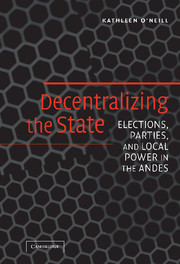3 - Decentralization in Comparative Perspective
Published online by Cambridge University Press: 02 December 2009
Summary
Introduction
The Andean countries present a rich and bewildering variety of experiences with intergovernmental power sharing. Despite their common geographical location, shared history, and roughly similar economic development, Bolivia, Colombia, Ecuador, Peru, and Venezuela behave quite differently during this time period in terms of decentralization. The richest and poorest countries – Venezuela and Bolivia – decentralize. Those with the greatest and least percentages of indigenous population – again, Bolivia and Venezuela – decentralize, while those in the middle – Ecuador and Peru – end the period very centralized. Looking at these countries over time, the experience becomes even richer, with Peru decentralizing in 1980, then recentralizing in 1992. Bolivia, Colombia, and Venezuela all decentralize in the 1980s and 1990s, but at different times, with Colombia decentralizing in two stages, first in 1982 and again in 1991, Venezuela decentralizing in 1989 and Bolivia waiting until 1994 to devolve power to localities. Ecuador and Peru end the period quite centralized, although Ecuador's 1998 constitution and political debates in Peru early in the Toledo presidency reveal some signs of change. How can this variety be explained?
The fact that decentralizing experiences differ across time within countries as well as between countries forces this analysis to look beyond country studies to explore the features of individual executive administrations within each country over time. Chapter 2 developed the argument that decentralization follows an electoral logic, along with several competing hypotheses.
- Type
- Chapter
- Information
- Decentralizing the StateElections, Parties, and Local Power in the Andes, pp. 49 - 86Publisher: Cambridge University PressPrint publication year: 2005



